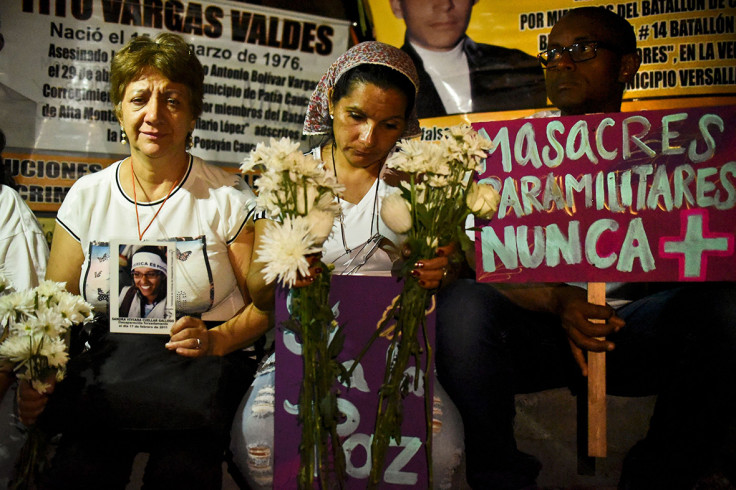Terrorism psychology: How terrorists justify carrying out atrocities to themselves
When confronted with a moral dilemma, terrorists exhibit different forms of reasoning.

Moral judgement by terrorists is abnormally guided by outcomes, a study has shown. Terrorists justify their acts by the logic that the ends justify the means.
This contrasts with the way non-terrorists reason. In recent years, many studies have shown that when most individuals judge the morality of an action, they do so by focusing more on intentions than on outcomes.
"If an action is aimed to induce harm, it does not matter whether it was successful or not. Most people consider it as less morally admissible than other actions in which harm was neither intended nor inflicted, or even actions in which harm was caused by accident", study authors Agustín Ibáñez and Adolfo García of Favaloro University, Argentina, told IBTimes UK.
As their paper published in Nature Human Behavior shows, terrorists reason differently. They appear to find attempted harm more permissible than other people. A better understanding of terrorist moral judgements could have important legal and forensic implications and may help researchers identify potential recidivists in the future.
Colombian conflict
The researchers worked with a sample of 66 ex-combatants from a paramilitary terrorist group in Colombia.
In the last decades, Colombia has been plagued by terrorist violence and armed conflict. More than 200,000 people have died over the past half century as a result. A lot more have been forced from their homes, kidnapped or tortured.
"Our study sheds light on the moral mindset of the perpetrators, suggesting that sensitive instruments examining socio-cognitive profiles might eventually help to characterise terrorist behaviour," Ibáñez explained.
With his colleagues, he conducted a battery of cognitive and psychological tests on the Colombian right-wing paramilitaries who had been imprisoned for committing terrorist acts. All had been convicted for murder, with an average of 33 victims per person. The scientists also conducted the same tests in 66 non-criminals (controls) and in 13 incarcerated murderers who were not terrorists.
They tested their IQ, executive functioning, aggressive behaviour, emotion recognition and performed moral cognition tests. These involved presenting the subjects with stories in which two characters interacted. In some of the scenarios, one of the characters harmed the other, intentionally or not. The study subjects had to give their opinion of whether these acts were morally reprehensible or not.
Terrorists showed higher levels of aggression and lower levels of emotion recognition. But the most striking result was that when judged the actions of others, they primarily focused on their outcomes, rather than on what people's intentions might have been. In comparison to the non-terrorist murderers and to the non-criminal controls, they judged attempted harm to be more permissible but accidental harm to be less permissible.
"Moreover, they were more poignant in their moral condemnation of accidental harm than attempted harm," the researchers pointed out.

No significant differences were observed between controls and non-terrorist murderers when it came to moral judgements.
Cause or consequence?
The authors argue that the paramilitary terrorism practised by their subjects is not really different from other forms of terrorism, as they also resorted to similar dehumanising practices.
However, it isn't clear whether the abnormal pattern of moral cognition they observe in their sample would be seen in other terrorist groups such around the world – particularly as religion and ideology do not seem to have been major drivers of the terrorist acts committed by the study participants.
"I think this study contains a major weakness in offering no definition of terrorism, nor acknowledgement of the difficulty of defining who or what a terrorist is," said Wing Commander Keith Dear, researcher in Experimental Psychology at Oxford University and a senior member of the UK Intelligence Services.
"Without a clear definition of the category, it's difficult to make useful comparisons. The 66 'terrorists' in their sample were members of right-wing paramilitary groups. But they were also individuals who gave themselves and their arms up willingly as part of a demobilisation process and none seem to have committed the kind of mass casualty terrorist attacks we associate with ISIS and Al Qaeda.. How representative are they of terrorists globally?"
One of the most important questions raised by this study is how terrorist moral judgements emerge. It's not yet possible to clarify whether the differences in cognitive reasoning observed in terrorists precedes their crimes, or occurs afterwards as they come to terms with rationalising what they have done.
"In other words, we don't know if faulty moral logic is present before they become terrorists, innate and present from birth, or developed through life ahead of the attacks. It might be that the shift in reasoning and cognitive processes comes after the attacks, and is a consequence of their becoming a terrorist," said Dear.
The authors of the paper say that more research would be needed to elucidate this particular question.
It will also be necessary to investigate whether these findings, replicated on larger scale, could help inform our understanding of recidivism rates among terrorists, which could be particularly useful in the Colombian context.
"Since the terrorists we assessed exhibited skewed moral judgements, emotion recognition impairments and high levels of aggression, it may be worth planning psychological or socio-cognitive interventions and monitoring programs on them upon release, especially considering the high levels of relapse reported among demobilised paramilitaries," Ibáñez concluded.
Ibáñez's research received support from the Ineco Foundation, Favaloro University, and CONICET in Argentina, the Universidad Autónoma del Caribe, Universidad de los Andes, ICESI University in Colombia, the Universidad Adolfo Ibanez in Chile and Boston College in the US.
© Copyright IBTimes 2025. All rights reserved.





















